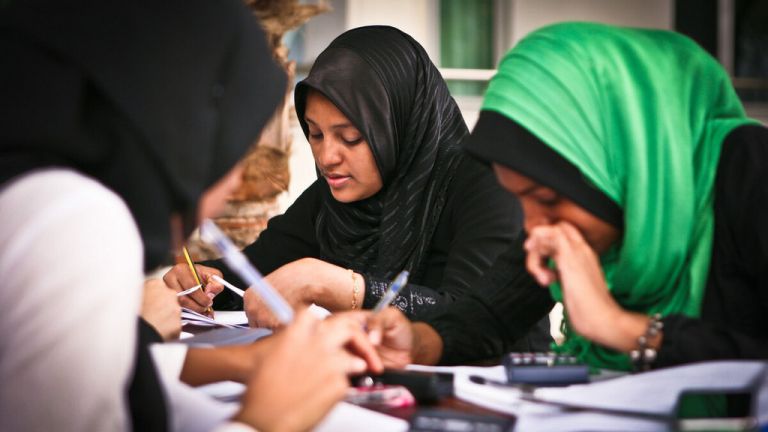Examining gender roles and social norms in contemporary Maldives requires an understanding of the country’s history and context. The Maldives is a predominantly Muslim country influenced by South Asian and Arab cultures. The Maldives has a unique culture and history and it has gender roles that have evolved over time. Let’s explore the gender roles of Maldives, how they have changed over time, and how they impact society today.
Traditional male and female gender roles of Maldives
The gender roles of Maldives have their origins in Islamic culture, which has been the country’s main religion for more than 800 years. In this culture, men are typically seen as the breadwinners and the head of the household. Women traditionally care for the home and children. Women are also expected to be modest and cover their bodies in traditional clothing. On the other hand men are not subject to the same dress code restrictions.
However, in recent years, these traditional gender roles of Maldives have begun to shift. Women are increasingly participating in the workforce, especially in the tourism and hospitality industries. This has led to greater economic independence for women and a more equal distribution of household responsibilities. Women are also increasingly involved in politics, with several women holding high-level government positions.
Social Norms on gender roles of Maldives
There are also cultural norms that reinforce the traditional gender roles of Maldives. For instance, it’s common practice to discourage women from participating in sports or other physical activities that are typically associated with men. There is also a lack of comprehensive sex education in schools. This contributes to negative attitudes towards women’s sexuality and reproductive rights.
In recent years, the Maldives has made significant strides in promoting gender equality and women’s rights. For example, in 2014, the Maldives ratified the Convention on the Elimination of All Forms of Discrimination Against Women (CEDAW). It requires signatories to take measures to eliminate discrimination against women in all areas of life.
How to examine gender roles and social norms? UK Dissertation Writing
One way to examine gender roles of Maldives is to look at the country’s laws and policies. For example, the Maldives has a male-dominated political system, with only a small percentage of women in parliament.
Another way to examine gender roles of Maldives is to look at cultural practices and beliefs. In Maldives, there’s a strong emphasis on gender segregation, with men and women often kept apart in public spaces.
To address these challenges, there is a growing movement to promote gender equality and challenge traditional gender roles of Maldives. This includes efforts to increase women’s access to education and employment, as well as initiatives to promote women’s political participation and leadership.
There are also efforts to challenge cultural practices and beliefs that perpetuate gender inequality. For example, some organizations are working to promote more progressive interpretations of Islam that prioritize gender equality and human rights.
UK Dissertation writing is challenging for any student, whether you are pursuing an Undergraduate, Master or PhD degree. It requires a lot of research work, analysis, and brainstorming even before you actually start writing which of course needs a lot of time and effort. It becomes even harder when you have a job or other commitments to balance. But you don’t have to struggle alone. Our professional dissertation writing services are here to support you. Unlike other websites that overcharge students for poor-quality work, The Academic UK offers more bang for your buck. We have a proven record of delivering high-quality dissertations that meet academic standards. That’s why 99% of our customers are happy and recommend us to others.
What are the causes of social norms about gender roles of Maldives?
Social norms are sets of unwritten rules that govern the behavior and interactions of individuals within a society. It might be challenging to alter these conventions because they are frequently strongly embedded in the society. A number of elements, such as religion, culture, and historical traditions, have influenced Maldivian social conventions about gender roles.
Islam, which is the dominant religion in the Maldives, plays a significant role in shaping gender roles. In Islamic tradition, males have a duty to focus on providing for their families as the main breadwinners. Also women are meant to prioritize household chores like cooking, cleaning, and childrearing. Social customs in Maldives, where women frequently consider themselves as inferior to males in both the home and the office. These customs continue to uphold this traditional gender labour divide.
Cultural factors also contribute to gender norms in the Maldives. Maldivian culture places a strong emphasis on family and community. Women have a responsibility to place the highest priority on their responsibilities as wives and mothers. This expectation can make it difficult for women to pursue careers or other goals outside of the home. As they may face social pressure to conform to traditional gender roles of Maldives.
Historical traditions also play a role in shaping gender norms in the Maldives. A monarchy with a predominantly patriarchal structure controlled the Maldives for centuries. In addition to being restricted to the domestic sphere, women weren’t able to take positions of leadership. While Maldives has since transitioned to a democratic system of government, these traditions still have an impact on social norms surrounding gender roles of Maldives.
How do gender roles and gender norms differ in Maldives?
Gender roles and norms are an integral part of the Maldivian culture, and they have evolved over time due to various factors.
The Maldives separate gender roles according to conventional Islamic ideas. In patriarchal cultures, males are typically the primary decision-makers and breadwinners and women have a duty to care for the home and the children. In contrast to women’s expectations to be modest and submissive, men should uphold women and provide for their families. This traditional gender role is still prevalent in many parts of the Maldives, particularly in rural areas.
However, the Maldives has undergone significant changes in recent years, and gender roles of Maldives are evolving. Women in the Maldives are increasingly educated and entering the workforce. This shift has led to a change in the traditional gender roles, and women are taking on more leadership roles in society. The Maldives government has also taken steps to promote gender equality and empower women.
Several pieces of legislation, notably the Convention on the Elimination of All Forms of Discrimination Against Women (CEDAW), which the country has ratified, were recently passed to protect women’s rights.
In recent years, there has been a push to challenge traditional gender roles of Maldives. Activists and organizations are working to promote gender equality and change societal attitudes towards women. For instance, the 2009-founded Maldives Women’s Council, which advocates for gender equality and aims to empower women.

